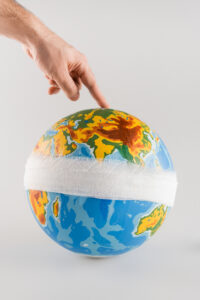Imagine a world where sunrise and sunset don’t happen every day. In this world, the basic flow of life on Earth is thrown off. The idea of Earth stopping its spin all of a sudden is a deep and unstable one that pushes the limits of what we know about how planets move and how they affect life. At the equator, our planet is spinning at a speed of about 1670 kilometers per hour (1037 miles per hour), which causes many things that are required for life as we know it to continue. This spinning action changes the length of the days and nights, the weather, ocean currents, and even the shape of the Earth.
We will talk about the strange things that would happen if the Earth stopped rotating. We will talk about the direct effects on the Earth’s surface, like how the Coriolis effect, which controls weather patterns, will stop working, as well as the potentially disastrous changes in the Earth’s crust, like huge earthquakes and tsunamis. We will also look at the long-term changes in climate that would happen because of changing the way sunlight falls, which would cause extreme temperatures and big changes in where people can live.
We will also talk about the effects on ecosystems and people’s lives, focusing on how the quick loss of the normal 24-hour day would change biological rhythms, farming, and infrastructure. The consequences on gravity and the form of the Earth will also be pointed out. The Earth’s present oblate spheroid form could slowly exchange to a greater spherical shape because it rotates, which could cause sea stages to upward thrust and fall in distinctive locations.
By looking at these aspects, we hope to get a full picture of the huge and far-reaching effects of the Earth stopping to rotate. This will give us a glimpse into a possible situation that shows how complex and delicate the balance of forces is that keeps life going on Earth.
Can Something Stop the Earth’s Spin?
The idea that the Earth might stop spinning is an interesting but wildly unlikely one. Due mostly to the conservation of angular momentum, the Earth has been rotating since its creation around 4.5 billion years ago. Because of tidal forces between the Earth and the Moon, this rotation has been progressively slowing down over time, but the process is exceedingly slow; it takes millions of years to see any change. A tremendous force, much beyond what humans could produce or any known natural phenomena, would be needed for the Earth to cease rotating suddenly.

Earthly Powers
Although a powerful outside force may theoretically stop the Earth’s rotation, there is very little chance that such an event will happen. An impact with a large mass object, such as a planet-sized body, might cause the Earth to rotate differently. But such a crash would also do the planet irreparable harm, maybe making it uninhabitable. A gravitational interaction with a gigantic object passing nearby, such as a rogue planet or a black hole, is another conceivable possibility. Still, considering the size of space and the stability of our solar system, this is a very unlikely scenario.
Influences of Humans
The energy needed to change the Earth’s rotation is far greater than even the most potent machines and technology that humans have created. Orders of magnitude more energy is required to stop the Earth’s rotation than all of the power generated by human civilization during history. As such, no human-made device is imaginable that could halt the Earth’s rotation.
Transitions
Though a sudden stop is not possible, Earth’s rotation can shift gradually. Tidal friction, brought about by the Moon’s gravitational attraction, gradually moves the Earth’s rotating energy to the Moon, hence extending the separation between the two bodies. By this process, our days get longer by roughly 1.7 milliseconds every century. This will keep slowing the Earth’s rotation over millions of years, but it will never entirely stop it in the lifetime of the Sun or the Earth.
Earth Stopped Spinning, What Now?
We probably wouldn’t be here if the Earth stopped spinning. If you don’t want to spend too much time on it, now you know.
Let us look at the specifics of what would happen, though:
- Right away, disasters would happen: If Earth stopped spinning all of a sudden, a huge amount of energy would be released, which would lead to earthquakes, tsunamis, and volcanic events. The crust of the world would shake violently as it tried to adapt to the change.
- Ocean Chaos: The seas move around as the Earth spins. Huge tidal waves would flood coastal areas and change the shape of landscapes if the spinning stopped. This would be bad for both sea life and land ecosystems.
- Atmospheric Mayhem: As the atmosphere changes to the new conditions, it would make winds as strong as hurricanes while still moving at the speed of the Earth. This would lead to huge storms and weather trends that are hard to predict.
- Changes in the temperature: The Earth’s rotation changes its temperature. Stopping it would cause big changes in temperature, wind patterns, and rain cycles, making the weather very extreme and hard to predict.
- Gravity Changes: If the Earth stopped rotating, the gravity would change. There would be less gravity in places close to the equator and more gravity in places close to the poles. These changes would have big effects on both people and nature.
- Day and Night: If Earth didn’t spin, it would always be dusk. It would no longer be day and night, which would be bad for all living things that rely on it for survival.
The world would still exist even if it wasn’t spinning, but life as we know it would be very different, and it would be very hard to stay alive.

Earth’s Existence Without a Spin?
As far as we can tell, every world in our solar system rotates in some way. And as far as we know, there are no worlds in the universe that don’t spin.
We all know that the Earth spins once every 24 hours. But the speeds at which other worlds spin are different. It takes 16 hours for Neptune to make one turn. Jupiter takes less than 10 hours, Saturn 11 hours, and Uranus 17 hours. It takes 25 hours for Mars to make one spin, which is a lot like Earth.
Okay, so each planet spins around. But does the world really need to spin in order to stay in the same place?
Not really.
In other words, Earth would still have gravity even if it didn’t spin. In this world, gravity pretty much holds everything together. In theory, Earth would still be around the Sun and spin around it like it does now if it didn’t spin.
Conclusion
To sum up, if Earth stopped spinning all of a sudden, terrible things would happen right away. The atmosphere of the planet would keep moving quickly, making strong winds that could reach over 1,000 miles per hour. This would cause a lot of damage, destroying forests, houses, and anything else in their way. Also, the quick stop would move the oceans around, which would cause huge tsunamis that would do even more damage to coastlines around the world.
In this theoretical look, we have only just begun to scratch the surface of how Earth’s rotation affects the delicate balance of life on our world.
As an example of the fragile balance that keeps our lives going, the effects of stopping a spin are both amazing and scary.
This is just a thought experiment, but it’s a good way to remember how many invisible forces hold everything together and make our world a safe place to live.
